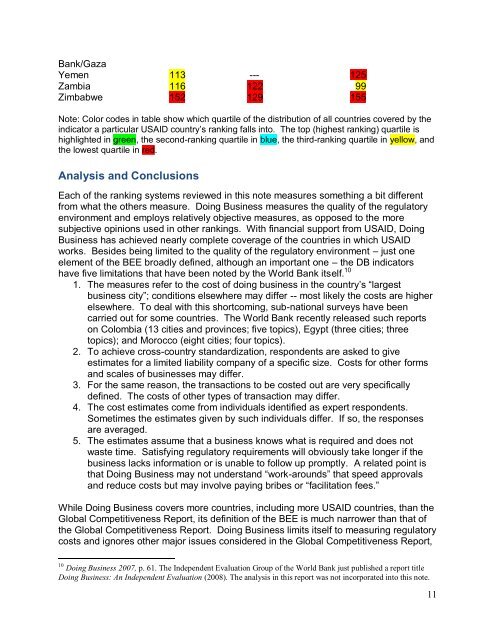Alternative Business Enabling Environment ... - Economic Growth
Alternative Business Enabling Environment ... - Economic Growth
Alternative Business Enabling Environment ... - Economic Growth
Create successful ePaper yourself
Turn your PDF publications into a flip-book with our unique Google optimized e-Paper software.
Bank/Gaza<br />
Yemen 113 --- 125<br />
Zambia 116 122 99<br />
Zimbabwe 152 129 155<br />
Note: Color codes in table show which quartile of the distribution of all countries covered by the<br />
indicator a particular USAID country’s ranking falls into. The top (highest ranking) quartile is<br />
highlighted in green, the second-ranking quartile in blue, the third-ranking quartile in yellow, and<br />
the lowest quartile in red.<br />
Analysis and Conclusions<br />
Each of the ranking systems reviewed in this note measures something a bit different<br />
from what the others measure. Doing <strong>Business</strong> measures the quality of the regulatory<br />
environment and employs relatively objective measures, as opposed to the more<br />
subjective opinions used in other rankings. With financial support from USAID, Doing<br />
<strong>Business</strong> has achieved nearly complete coverage of the countries in which USAID<br />
works. Besides being limited to the quality of the regulatory environment – just one<br />
element of the BEE broadly defined, although an important one – the DB indicators<br />
have five limitations that have been noted by the World Bank itself. 10<br />
1. The measures refer to the cost of doing business in the country’s “largest<br />
business city”; conditions elsewhere may differ -- most likely the costs are higher<br />
elsewhere. To deal with this shortcoming, sub-national surveys have been<br />
carried out for some countries. The World Bank recently released such reports<br />
on Colombia (13 cities and provinces; five topics), Egypt (three cities; three<br />
topics); and Morocco (eight cities; four topics).<br />
2. To achieve cross-country standardization, respondents are asked to give<br />
estimates for a limited liability company of a specific size. Costs for other forms<br />
and scales of businesses may differ.<br />
3. For the same reason, the transactions to be costed out are very specifically<br />
defined. The costs of other types of transaction may differ.<br />
4. The cost estimates come from individuals identified as expert respondents.<br />
Sometimes the estimates given by such individuals differ. If so, the responses<br />
are averaged.<br />
5. The estimates assume that a business knows what is required and does not<br />
waste time. Satisfying regulatory requirements will obviously take longer if the<br />
business lacks information or is unable to follow up promptly. A related point is<br />
that Doing <strong>Business</strong> may not understand “work-arounds” that speed approvals<br />
and reduce costs but may involve paying bribes or “facilitation fees.”<br />
While Doing <strong>Business</strong> covers more countries, including more USAID countries, than the<br />
Global Competitiveness Report, its definition of the BEE is much narrower than that of<br />
the Global Competitiveness Report. Doing <strong>Business</strong> limits itself to measuring regulatory<br />
costs and ignores other major issues considered in the Global Competitiveness Report,<br />
10 Doing <strong>Business</strong> 2007, p. 61. The Independent Evaluation Group of the World Bank just published a report title<br />
Doing <strong>Business</strong>: An Independent Evaluation (2008). The analysis in this report was not incorporated into this note.<br />
11

















